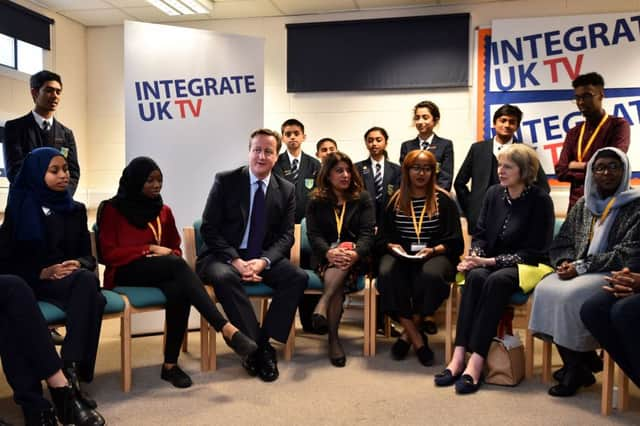Moderate Muslims must ‘own’ extremism, says Cameron


Launching the government’s counter-extremism strategy, the Prime Minister warned it was no time for “kid gloves” when faced with the threat to Britain’s values of democracy, equality and tolerance.
He challenged Muslim communities to “own” the problem, saying that ultimately it was the “silent majority” who rejected extremism who were key to driving out the radicals.
Advertisement
Hide AdAdvertisement
Hide AdThe strategy document emphasised the need to root out extremism across a wide range of institutions including schools, universities, local councils, the NHS, charities and prisons.
While extremism had to be combated in all its forms – including neo-Nazism, Islamophobia and anti-Semitism – Mr Cameron said that it was the fight against Islamist extremism, which represented “one of the great struggles of our generation”.
The plan includes a review of the rules of British citizenship – including strengthening the “good character” consideration and whether an applicant has promoted extremist views.
There will be an extension of powers for passports to be withdrawn from young people at risk of travelling abroad to join groups such as Islamic State (IS).
This has already been used on several under-16s since it was introduced in July, and will now be available for 16 and 17-year-olds.
There will be bans on radical preachers posting material online, and internet firms will work more closely with police to stop extremist material being disseminated.
Anyone with a conviction or civil order for terrorist or extremist activity will also be automatically barred from working with children and vulnerable people. During a visit to a school in Luton, Mr Cameron said: “We need a comprehensive strategy.
“That means it is not just the police and our border force and our security services. It is for everyone to fight extremism.
Advertisement
Hide AdAdvertisement
Hide Ad“We need to recognise that the poison of extremism is corrupting young minds and we need to stop it right where it starts.”
The Prime Minister said the “vast majority” of British Muslims want to “call out the small number of extremists in their midst”.
He added: “One of the things the government is doing by having this comprehensive strategy to fight extremism is that we are empowering the moderate voices to come forward to say ‘This isn’t our religion, this isn’t what our community is about,’ and they want us to do this.”
Asked about the so-called “snooper’s charter”, he said the government will be “coming forward with our proposals”.
He added: “Combating extremism requires work by the police, by the intelligence services. You need to have the powers necessary to stop terrorism.
“Those things are important but no one becomes a terrorist from a standing start.”
However, the Muslim Council of Britain warned that the strategy was “flawed” and counter-productive, and alienated the Muslim communities whose support the Government was seeking.
“Whether it is in mosques, education or charities, the strategy will reinforce perceptions that all aspects of Muslim life must undergo a ‘compliance’ test to prove our loyalty to this country,” said MCB general secretary Shuja Shafi.
“We cannot help but also detect the McCarthyist undertones.”